Dr. Ron Kendall News
October 21, 2025
Texas Tech Professor Recognized for Efforts to Revive Texas Wild Quail
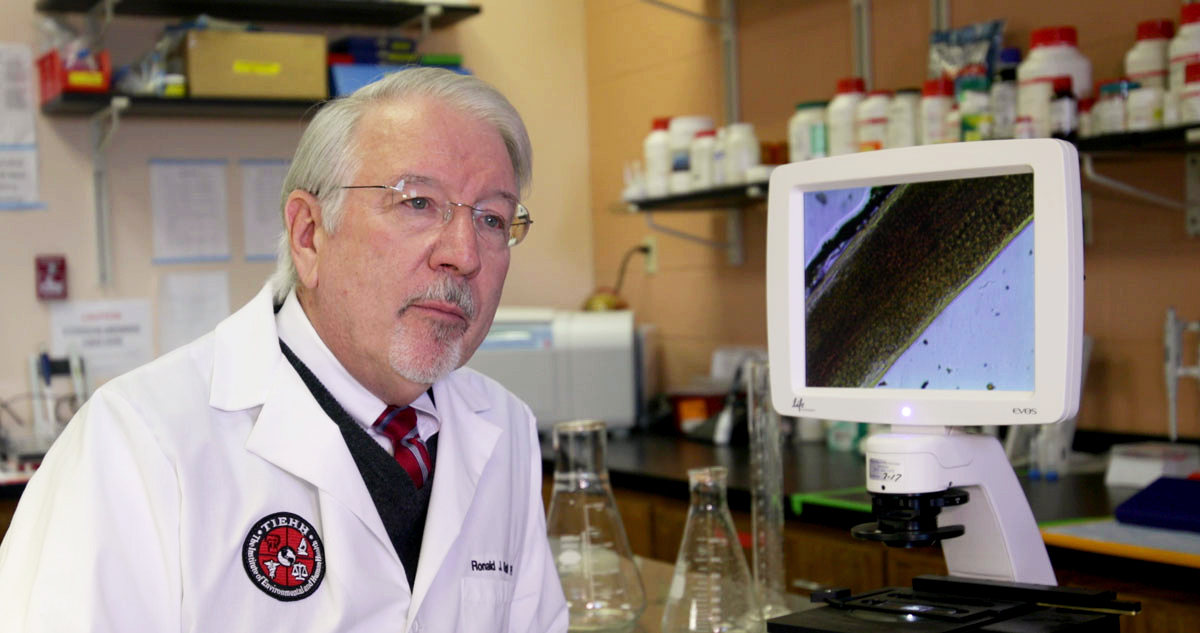
Ronald Kendall received an individual award from the Texas Commission
on Environmental Quality for developing medicated feed to restore a key
game population.
Thanksgiving Day of 1964 is a day Ronald Kendall, a professor in Texas Tech University’s Department of Environmental Toxicology, will never forget.
It was the culmination of years of tagging along with his grandfather and his Llewellin
setter, Fannie, on early morning quail hunts, attentively watching and listening to
instructions from a seasoned outdoorsman. Though the 12-year-old Kendall had first
been introduced to the sport at the age of six, he had never pointed a gun and shot
at live birds.
Until that day.
When South Carolina’s most famous game population was much higher than it is now,
hunting season always opened on Thanksgiving. And after years of anticipation and
likely incessant badgering, Kendall's parents finally gave him the green light to
use live ammunition while out with his grandfather, who had traveled the short distance
from his own home with Fannie for the occasion.
It was a crisp fall morning in Florence County, with frost still on the ground and
the sky a demure shade of
blue even approaching nine o’clock; the sun lazily rising from its slumber as grandfather
and grandson left
Kendall’s home and headed for the woods. Within a few hundred feet from the front
door, their prized bird dog had already picked up the scent of roughly 20 quail feeding
in a circle. Fannie froze on point, one leg in the air, her tail pointing toward the
heavens and the rest of her directed at the birds. The time was drawing near for Kendall
to take his first shot at a wild quail over a pointed bird dog.
His grandfather nudged the nervous adolescent to walk in front of Fannie and aim his
single shot .410 Gauge shotgun, instructing Kendall to pick one bird at the covey
flush of the quail and out of the group, focus on one bird to take the shot.
Suddenly, the sky erupted in quail. In a split second, Kendall fixated on a bird flying in front of him. He pointed his gun, closed his eyes and fired.
“My grandfather shouted out, ‘Good shot, son!’” Kendall says. “I opened my eyes and
feathers were trailing across the sky. I got him.”
Bird in hand after Fannie retrieved and delivered it, his grandfather again marveled
at how well Kendall had done. Decades later, Kendall laughs while telling the story,
adding that he never had the heart to inform his grandfather this milestone was accomplished
while essentially blindfolded.
“After that first shot, I’ve always kept my eyes open and focused on one bird to shoot
at the covey rise,”
Kendall adds.
Before long, the duo of Kendall and Fannie took down three quail on three shots, the
first day of a two-week idyll in which Fannie stayed at Kendall’s home. Kendall would
follow the setter around his expansive surrounding property, hunting whenever he could,
thriving in a landscape filled with quail. Kendall was around the same age of 12 when
he told his parents he dreamed of a career in wildlife and the environment, with a
focus on conservation fostered while fishing and hunting with his grandfather. His
foray into environmental toxicology, long before it officially existed, occurred while
he was an undergraduate, conducting frontline research in an insect toxicology laboratory
on insecticides for cotton boll weevils.
“The only thing the scientists were worried about was killing the insects,” Kendall
says. “I was saying, ‘What
about the birds and the wildlife?’”
Decades into his life’s work, Kendall has displayed that same care for the environment,
working to restore one of the last remnants of what used to be a quail hunter’s paradise
across the southeastern United States.
Thanks to Kendall’s invention of QuailGuard® medicated feed, which the Food and Drug
Administration (FDA) approved in 2024, the West Texas wild quail population is experiencing
a resurgence where QuailGuard® is utilized in treatment. The medicated feed also earned
him an individual 2025 Texas Environmental Excellence Award (TEEA).
-----------------------------------------------------------
July 2, 2025
Honoring Dr. Ronald J. Kendall Conservation Leader & TEEA 2025 Individual Winner | Original by TCEQ
We proudly share this inspiring feature on Dr. Ronald J. Kendall, Professor of Environmental Toxicology and founder of the Wildlife Toxicology Laboratory (WTL) at Texas Tech University in Lubbock, Texas.
Originally produced by the Texas Commission on Environmental Quality (TCEQ) – view
their channel at @TCEQ Watch the original video here: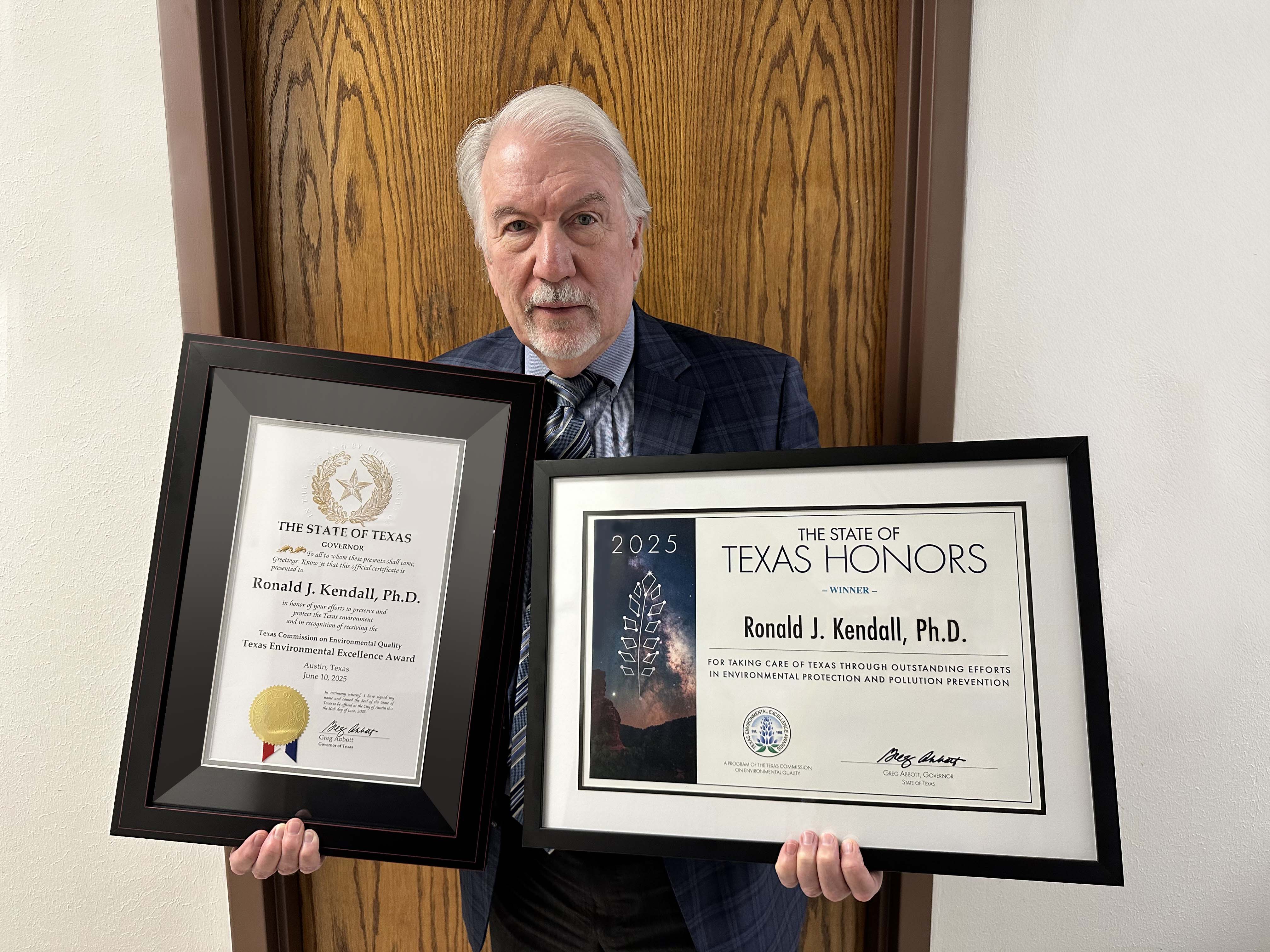
Dr. Kendall’s pioneering work addresses the severe decline of Texas’ northern bobwhite
quail populations, which have dropped by up to 90% statewide. In 2012, he established
the WTL to combat parasitic diseases threatening wild quail. His groundbreaking solutions,
including the FDA-approved QuailGuard® medicated feed and QuailSafe® delivery system,
mark the first publicly available medicated feed for wildlife in the U.S. natural
habitats. Since deploying these tools at demonstration ranches, sustainable wild quail
populations have rebounded by as much as 500% in some areas. This is a remarkable
achievement benefiting Texas’ native grasslands and ecosystem health. This video highlights
Dr. Kendall’s lasting impact on wildlife conservation in Texas and celebrates his
recognition as the TEEA 2025 Individual Winner.
-----------------------------------------------------------
February 18, 2025
Treating Northern Bobwhite for Parasitic Infection Supports Sustainable, Huntable Populations
News provided by
EIN Presswire
Feb 17, 2025, 7:56 PM ET
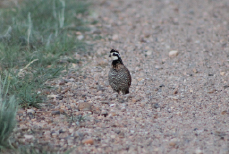
Texas Tech University Wildlife Toxicology Lab article lays out QuailGuard®’s success story for the species and landowners.
We have evidence and proof of the effectiveness of the medicated feed. On our ranch, the eyeworm infection rate has fallen from 100% in 2017 to less than 10% today. ”— Owner of Snipes RanchLUBBOCK, TX, UNITED STATES, February 17, 2025 /EINPresswire.com/ -- QuailGuard®, the FDA-Approved medicated feed developed by Dr. Ronald Kendall at Texas Tech University’s Wildlife Toxicology Lab in May 2024 has been tested for many years across ranches and private land in Texas and Oklahoma. Multiple studies prove QuailGuard-medicated bobwhite populations increase and sustain more huntable populations than non-treated populations. The article, “Treating Northern Bobwhite for Parasitic Infection Supports Sustainable, Huntable Populations,” written by Texas Tech Graduate Research Assistant Hannah N. Suber, proves how well.
-----------------------------------------------------------
May 2022
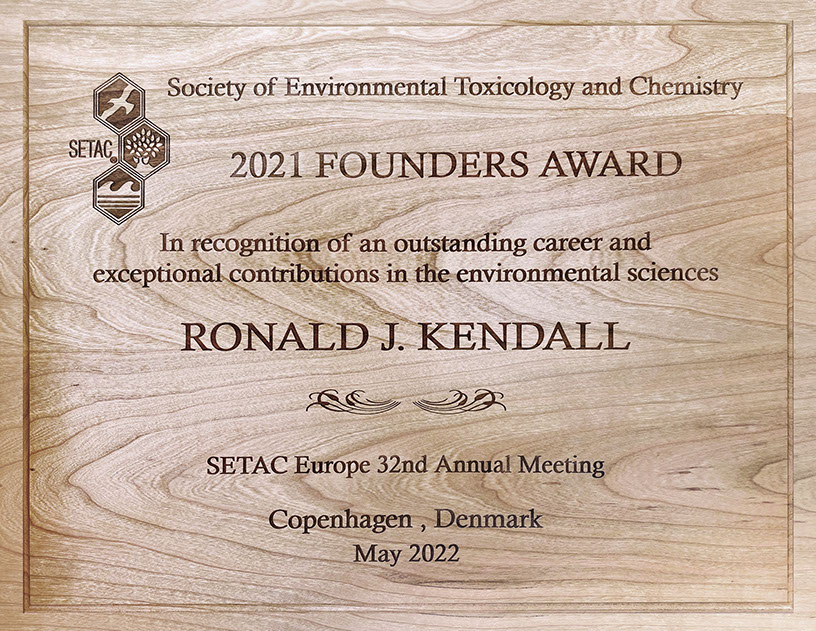 Texas Tech professor received the highest honor from global organization, SETAC in May 2022.
Texas Tech professor received the highest honor from global organization, SETAC in May 2022.
Dr. Kendall Received Global Recognition, Acclaim for his Environmental Toxicology
Research.
The Society of Environmental Toxicology and Chemistry awarded the 2021 Founders Award to Dr. Ronald J. Kendall in rocognition of an outstanding career and exceptional contribution in the environmental sciences, at the
SETAC Europe 32nd Annual Meeting in Copenhagen, Denmark. The prestigious Founders Award is the highest honor SETAC can bestow.
-----------------------------------------------------------
January 7, 2022
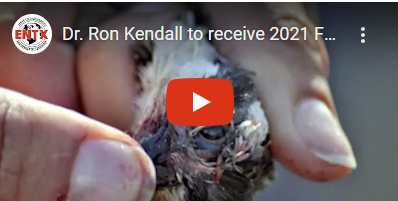
Texas Tech professor, saving West Texas quail, will receive the highest honor from
a global organization Jan 7, 2022
by: Elizabeth Fitz
Posted: Jan 7, 2022 / 06:39 PM CST / Updated: Jan 8, 2022 / 05:12 PM CST
LUBBOCK, Texas — Ronald Kendall, Ph.D., a professor of environmental toxicology at Texas Tech University, told KLBK News on Friday he will receive the 2021 Founders Award from the Society of Environmental Toxicology and Chemistry for his contributions to scientific development.
He said it’s the highest honor one can receive in his field on a global level.
“We have to think larger and bigger as we think about the planet and its future, and the protection of biodiversity,’ Kendall said, adding it’s important to, “Reclaim water, air and food supply.”
His ‘think bigger’ mentality has carried him throughout his career to where he is today- months away from receiving the award in Copenhagen, Denmark.
“I’m looking forward to that, but also very pleased and grateful to have been identified as a significant contributor to the field of environmental toxicology,” he shared.
Many of his publications explored “how to structure studies that would advance the science of wildlife and environmental toxicology.”
Since 2012, Kendall has been working to save the West Texas quail population, which, according to his studies, is struggling to sustain itself.
“What emerged from that was our discovery of significant parasitic disease and our wild quail,” Kendall said.
The parasitic diseases he found affect quails’ ability to see, fly and ultimately survive.
“We’re not talking about losing a few quail. We’re talking about losing 90 to 95% of a population from a given zone, and that’s what our data is telling us,” he said.
Kendall added it takes years for quail to recover when 90% of the population is lost.
He told KLBK News he’s been working closely with the Food and Drug Administration since 2015 to get approved a medicated feed that has shown to dramatically improve the health of the species.
“We’re very excited with the results we’re seeing- and the ability to treat wild quail in their natural environment, and not hurt them, but get rid of these parasitic infections,” he shared.
See what Texas Tech said about impact below.
Texas Tech News Release
“DATE: Jan. 7, 2022
Professor Receives Global Recognition, Acclaim for Environmental Toxicology Research
Ronald Kendall will be honored with the Society of Environmental Toxicology and Chemistry’s
2021 Founders Award in May.
…………………………………………………………………………………………………………………
2021
Ronald Kendall, a professor of environmental toxicology at Texas Tech University, has been selected to receive the Society of Environmental Toxicology and Chemistry’s (SETAC) 2021 Founders Award for his contributions to environmental research. Kendall will be presented with the award by the SETAC World Council and the SETAC Global Awards Committee in Copenhagen, Denmark, in May.
“I am very appreciative to be recognized by the SETAC global organization with this high honor,” Kendall said. “SETAC is making significant environmental science advancements worldwide and I am very grateful to have contributed to this advancement.”
The highest honor SETAC can bestow, the Founders Award is granted once yearly to an individual who has made outstanding contributions to scientific development. Kendall has spent much of his scientific career studying the ecological impacts of environmental contaminants on wildlife and promoting a more ecological approach to environmental risk assessment.
“Dr. Kendall richly deserves this recognition,” said Michael Honeycutt, director of the Toxicology, Risk Assessment and Research Division for the Texas Commission on Environmental Quality. “His cutting-edge research has led to innumerable advances in the field of ecotoxicology.”
Kendall is the founding director of Texas Tech’s Institute of Environmental and Human Health (TIEHH) as well as the founding chairman of the Department of Environmental Toxicology, in which TIEHH is housed. Kendall is a charter member of SETAC and served as president of the organization from 1992-1993. He has served as either editor or associate editor of SETAC’s scientific journal, “Environmental Toxicology and Chemistry” (ET&C), for more than three decades.
“I have known Dr. Kendall for nearly 30 years,” said Elaine Dorward-King, retired executive vice president of sustainability and external relations for Newmont Mining Corporation. “During that time, he has made numerous important contributions to environmental science and in particular wildlife toxicology. Dr. Kendall is one of those rare individuals who is able to communicate complex scientific concepts in an understandable and useful manner, helping to improve public understanding and appreciation for how science helps solve real-world problems.”
About the Society of Environmental Toxicology and Chemistry
The Society of Environmental Toxicology and Chemistry (SETAC) is an international nonprofit organization with more than 5,000 members in 90 countries dedicated to the advancement of environmental research and education. Click here to learn more about SETAC’s mission, vision, principles and values.”
Department of Environmental Toxicology
-
Address
Department of Environmental Toxicology, Texas Tech University, Box 41163, Lubbock, TX 79409 -
Phone
806.742.4567
